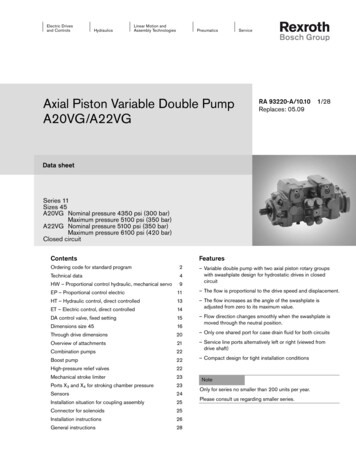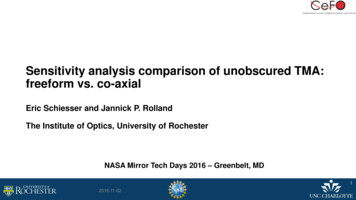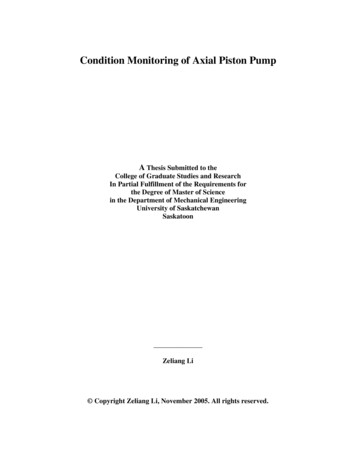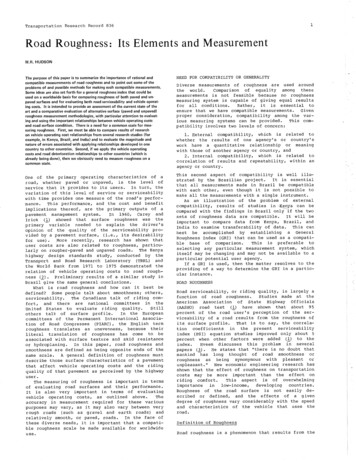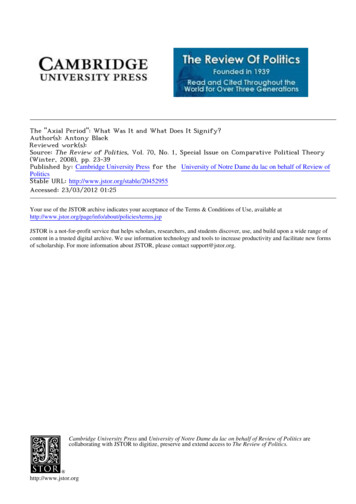
Transcription
The "Axial Period": What Was It and What Does It Signify?Author(s): Antony BlackReviewed work(s):Source: The Review of Politics, Vol. 70, No. 1, Special Issue on Comparative Political Theory(Winter, 2008), pp. 23-39Published by: Cambridge University Press for the University of Notre Dame du lac on behalf of Review ofPoliticsStable URL: http://www.jstor.org/stable/20452955 .Accessed: 23/03/2012 01:25Your use of the JSTOR archive indicates your acceptance of the Terms & Conditions of Use, available at ms.jspJSTOR is a not-for-profit service that helps scholars, researchers, and students discover, use, and build upon a wide range ofcontent in a trusted digital archive. We use information technology and tools to increase productivity and facilitate new formsof scholarship. For more information about JSTOR, please contact support@jstor.org.Cambridge University Press and University of Notre Dame du lac on behalf of Review of Politics arecollaborating with JSTOR to digitize, preserve and extend access to The Review of Politics.http://www.jstor.org
The Review of Politics 70 (2008), 23-39.Copyright g University ofNotre DameDOI: 10.1017/S0034670508000168 Printed in theUSAThe "Axial Period": What Was It andWhat DoesIt Signify?AntonyBlackAbstract: Karl Jaspers coined the term the "axial period" to refertowhat he saw as thesimultaneous development in several differentand separate societies-China, India,"a new departure within mankind." What he meant hasIran, Israel, Greece-ofbeen characterized as "a kind of critical, reflectivequestioning of the actual and anew vision of what lies beyond." While it is true that people in each of theseseparate cultures began to develop new ways of talking about the cosmos, ethics,and community, Jaspers's approach and description of these phenomena were,I shall argue, highly defective. This has led to serious misunderstandings of whatwas involved.Ithas becomewidely accepted thatsomethingwas specialabout theperiod inworld historyinwhich thereoccurred,alnost simultaneouslyit isbelieved,thepreachingof themajor Hebrew prophetsaround the timeof theExile,1the firstdevelopment of science and philosophy inGreece fromThales toAristotle,2thegrowthof philosophy,and especiallypoliticalphilosophy,inChinafrom Confucius(d. 479 BCE)to the Legalistsin the third centuryBCE,3 and the exposition of religious philosophy in India in theUpanishads (a littleearlier,c. 800 to c. 600 BCE).4 Karl Jasperssuggestedthat this "axialperiod,"5as he calledit, amountedto "a newdeparture2NormanGottwald, TheHebrew Bible:A Socio-LiteraryIntroduction(Philadelphia, PA:Fortress Press, 1985).2TheCambridgeHistory ofGreek and Roman Political Thought, ed. Christopher Roweand Malcolm Schofield (Cambridge: Cambridge University Press, 2000), part 1.3A. C. Graham, Disputers of theTao: PhilosophicalArgument inAncient China (La Salle,IL: Open Court, 1989); Yuri Pines, "Envisioning Empire: Chinese Political Thought oftheWarring States Period (453-221 BCE)" (Hansbula: Hawaii University Press, forthcoming). I am very grateful to Professor Pines forallowing me to see thisbook beforepublication.4SeeU.N. Ghoshal, A History of Indian Political Ideas: TheAncient Period and thePeriodto theTransitionMiddle Ages (Oxford:Oxford University Press, 1959).of5Karl Jaspers, "The Axial Period," in Karl Jaspers, The Origin and Goal ofHistory(New Haven: Yale University Press, 1953), 1-25, 17. Hereafter cited in textby pagenumber. This has been discussed in Daedalus 104 (Spring 1975) and in The Originand Diversity of Axial Age Civilizations, ?d. S. N. Eisenstadt (Albany, NY: State23
24THE REVIEW OF POLITICSwithinmankind,"meaning "a kind of critical,reflectivequestioningof theactual and a new vision ofwhat liesbeyond."6 Jaspersand othershold thatthe intellectualand spiritualachievementsof this timehave inspiredmostof humanity ever since. Itwas then, they say, that the foundationsof allmajor world civilizationswere laid down.The "axial age" has come tobe viewed as thegreatestsingle turningpointinworld historyso faras thingsof themind (Geist)are concerned.Jaspersandthosewho thinklikehim speak as ifall the subsequent developments ofhumanity in themental sphere flow from these sources.Applying thisone would say that thinkerssuchbelief to thehistoryof political thought,7as Isaiah, Plato, and Confucius performedbreakthroughsthatestablishedthe terrain forwhat wasto come.At first,these coincidences in time do appear striking.In this article,however, Iwant to argue thatthiswhole language and approach,while notcompletely inaccurate,are liable seriously tomisrepresentwhat actuallyhappened both thenand later.A Period?The concept of an axial period or age does not hold up. This fallacy is cleareven in Jaspers's own definition of it as "the period around 500 BC, in thespiritual process that occurred between 800 and 200 BC" (1). This timeframeIt is, indeed, very striking that theseis too elastic to be called a "period."developmentswere fairlyclose toone another in time,yet completelyseparate geographically; therecan be no question of influence.Jaspers'sdates,however, seem to have been contrived primarilywith the HebrewScripturesinmind; whilethe Upanishadsalso date partly from around800BC, inGreece and China creative thoughtdid not begin until some threecenturieslater.Equally serious, themental phenomena which Jaspersascribed to this"period" appeared in Egypt and Mesopotamia and Iran8many centuriesearlier.One prehistorianof theLevant findsthemactuallypreceding,and inUniversity of New York Press, 1986). Most recently,Karen Armstrong, in The GreatTransformation:The World in the Time of Buddha, Socrates, Confucius and d2006), whichembroideredis a majorJaspers'sachievementof high-classpopularinotions.6Benjamin I. Schwartz, "The Age of Transcendence," Daedalus 104 (1975): 3.7The argument for this article came out ofwork I am doing for "AWorld History ofAncient Political Thought," to be published by Oxford University Press in about twoyears.8R. C. Zaehner, The Dawn and Twilight ofZoroastrianism (London: WeidenfeldNicolson, 1961). Zoroaster probably lived between 1500 and 1300 BCE.and
THE "AXIAL PERIOD"25In textsfromhis opinionhelping to stimulate,theintroductionof agriculture.9earlyEgypt, such as "ADispute over Suicide"l0 (probablydating fromlatethirdmillenniumBCE), we find sentimentsno less reflectiveand personalthan those thatJaspersfindstypicalof theaxial period.11In othercases,weknow too littleabout earlierperiods toassume thattherewas no similarlyoriginal thinkingbehind, forexample, thedevelopmentof socioethicalcustomsAt theotherend ofof thenationof Israel.12(ii:rites)inChina or st importantsurvivingdocumentofancientIndian political thought,13was composed between the thirdcenturyBCE and thesecondcenturyCE, thatis,well aftertheend of Jaspers'speriod.While thesurgeof creativethinkingin theancientworld didmore or lesscome to a close at approximatelythe timeJaspersstates (with the aboveexception),mental events at numerous otherpoints in timecould equallywell be described as "axial." I do not see on what grounds, forexample,theriseofChristianity,theriseof Islam, theEuropean Reformation,and theEuropean Enlightenmentare tobe excluded, since thesewere also historicalmomentswhen a similardeepening of ethicsand human bonding, similarexplorationsof possiblemeanings of human existence,took place. Othersmightwish to extend the list in otherways. Jaspersmight have respondedby arguing thatsuch laterdevelopmentsall stemmedfromtheoriginalbreakthroughs.But thatassertionwould assume that therewas littleor no truemovements-an absurd proposition.I do not, thereoriginalityin theselaterfore,see how one can possibly confineaxial developments to thisperiod.Therewas no identifiableaxial period.What Were"Axial" Movements About?Iwould agree thattherewere, nonetheless,certainphenomena of thekind towhich Jaspersreferredthatwere distinctive.Yet here, too,Jaspers(and others)9Compare Jaspers, "The Axial Period," 2 (quoted below), with Jacques Cauvin, TheBirthof theGods and theOrigin ofAgriculture, trans.T.Watkins (Cambridge: CambridgeUniversity Press, 2000/1994), esp. 67-69.10JamesB. Pritchard, ed., Ancient Near Eastern Texts Relating to theOld Testament(Princeton,NJ: Princeton University Press, 1955), 405-7.11"Justice (lasts) forever and goes down into thenecropolis with himwho renders it.When he isburied . his name isnot wiped out from the earth,but he is rememberedforhis goodness. That is a principle of the divine order" (inscription of c. 1850 BCE):cited inHenri Frankfort et al., The IntellectualAdventure ofAncient Man (Chicago:Chicago University Press, 1946), 84.12Probably in the thirteenth-twelfthcenturies BCE: Norman K. Gottwald, The TribesofYahweh:A Sociology of theReligion ofLiberatedIsrael, 1250-1050 BCE (Maryknoll,NY:Orbis Books, 1979).13The KautiliyaArthashastra,of Bombay, 1969).ed.andtrans. R.P.Kangle,2nded.(Bombay:University
THE REVIEW26OF POLITICShave seriously skewed a promising line of analysis. First, the use of theall-embracing,universalistic term "axial" has spawned a tendency toassume thatphenomena in differentcultureshad more in common thanwas actually the case.14Second, Jaspers'sgeneralized descriptionofwhataxial movementswere about consistentlydrew attentionto theirreligiousaspects at the expense of everythingelse. Consequently,much ofwhat hesaysis moreappropriatefor Israel andIndiathan it is for ChinaandGreece. His initialsummary is as follows (I italicizepassages thatseem toreferprimarily,ifnot exclusively,to religiousphenomena and have littleorno relevancetoGreece or China):What isnew about thisage . is thatman becomes conscious ofBeing as aHe experiences theterrorof theworld andwhole, of himself and his limitations.his own powerlessness.He asks radical questions. Face to facewith thevoidhe strives for liberation and redemption. By consciously recognisinghislimitshe sets himself the highest goals. He experiences absoluteneness inthe depths of seljhood and in the lucidityof transcendence. In this agewere bom the fundamental categories within which we still think today,and thebeginnings of theworld religions,by which human beings still live,were created. The step into universality was taken in every sense(Jaspers, 2).The language clearlysuggests thatJaspershad inmind, above all, religiousphenomena,and religiousphenomena of a particularkind.15In fact,his definition privileges thebreakthroughsthatoccurred in India and Israel verymuchat the expenseof those that occurredin Chinaand Greece. Moreover,to implythat"world religions"such as Christianityand Islamwere formedduring thisperiod ratherthanin thefirstand seventhcenturiesCE, respecthaving initiallyreferredtoChina, India, Iran,ively,is absurd. Furthermore,Palestine, and Greece, Jaspers then proceeds to refersimply to "China,India and theWest . these threeorigins" (Jaspers,2, 9).He lumps together,misleadingtherefore,Israel,Greece, and Iran,and introducesthehistoricallynotion of "theWest." This was not only a peculiarly flagrantinstanceof"orientalism" (actuallymaking Iran part of theWest), but by implicitlydenying the independentrole ofGreece, Jaspersdowngrades and perhapsexcludes altogetherdevelopments inphilosophyand science.The phenomena inquestionwere, indeed,remarkableand unprecedented,but I suggest theymay be more accuratelydefined in termsdifferentfrom14One finds this in, for example, Shmuel N. Eisenstadt, "The Axial Age: TheEmergenceof TranscendentalSociology 23 (1982): 294-314.15For aninterestingcommentVisionsonandthe Risetranscendence,of Clerics,"see HeinerRoetz,EuropeanConfucianJournalofEthicsofthe Axial Age: A Reconstruction under the Aspect of the Breakthrough towardsPostconventional Thinking (Albany, NY: State University of New York Press, 19921993), 273.
THE "AXIAL PERIOD"27thoseused by Jaspersand his successors.What distinguishestheaxial stage isan approach to the selfand to thecosmos thatismore reasoned,brooding,reflective,self-conscious,and at the same timemore articulate.Therewas,indeed,a fullerawarenessof theinteriorperson (whichalso foundexpressionin literature and the plastic arts). But therewasalso (as we shall see) a politicaland social dimension thatJaspersall but ignored.Therewas discontentwiththeexecutionofdaily concerns,a searchforbetterways oforganizingsociety,and a greaterdemand forself-sacrifice.People were seekingboth tounderstand and, at the samefor changesin attitudetime, to change the wayas conduct.as welllife is; they wereThis wasverylookinginclearConfucius16and alsoMozi, inSolon,Aeschylus,Plato, and theHebrew prophets; itwas less evident in India.Iwould prefertoabandon theterm"axial"with itsslightlymystical (astroWe shouldperhaps referto thephenomena inquestionlogical?)connotation.as strivingstowardmental andmoral discoveryand refinement.I shall,therefore,use the term"breakthrough."Therewas a new refinement,or sharpening,of ethicsand themind, based on principlesand ideals conceived inmoregeneral terms,and in their relation to the cosmos- and sometimes tohumanity-as a whole. What was involvedwas nothing less than a newof our experienceand a new set of goals. This is trueboth ofinterpretationthe societiesor culturesrelated to theevents in question and also, in somecases-notably Greece and Israel-of many other societies towhich theirachievementswere transmitted.One novel featureof theseculturaleventswas thattheywere set inmotionby individualsstillknown tous, eitherbywhat othersrecordedabout themand theirteachings,or bywhat theythemselveswrote. Each of theseindividuals thoughtand lived in conscious and difficultothernessfromtheirsurroundings.And yet-as Jaspersand othershave powerfullystated-theyeach affectedover very longperiods theways inwhich people think,live,and behave, even today.TraditionAll thischange involveda seriesof new attitudestoward tradition.Variouswere adopted. One could (1) reverethegood old traintellectualstrategiesdition, but interpretit according to one's own convictions,using thisas a standard for the reformof existingpractices ofwhichinterpretationone disapproved, but stillwith the intentionof maintaining the "true"tradition and its originalspirit. In other words,one couldset out to restorethe good old tradition;examples might be Confucius and theHebrew16See Roetz, Confucian Ethics of theAxial Age, 24-40, 47, 273, 276-77; BenjaminI. Schwartz, The World of Thought in Ancient China (Cambridge, MA: HarvardUniversity Press, 1985), 51, 79.
28THE REVIEW OF POLITICSprophets. (This practice could functionas a convenientway of inducingchangewithin a textualrevelation.)(2)One could contest traditionas suchand innovateexplicitlybut without calling everythingintoquestion. Thewhile radicallyBuddha retainedthe idea of karma (moralcause and effect)it.Laozi declared that "theDao which is called theDao isreinterpretingnot theDao." 17 The Buddha and Socrates denied that traditionpossessedany value; onemust startafresh,relyingon one's ownmind and experience,which, indeed,means "transcending"(touse the termwhich so appealed toJaspers)tradition.(3)One could assume nothingand subjecteverythingtoscrutiny,interpretingbothwhat existsand human possibilitieswithout anyregard forwhat others had said. All beliefs and principles are open todebate. This approachwas adopted by some Greeks, notably theSophistsand Socrates.Theymade enquiryand intellectualopenness into theactualaim and principleofmental activity.Some Chinese thinkerswere inpracticeequally open-minded.ClassInThinkers indifferentculturestooka varietyof views on class structures.18general, the old landed aristocraciestended to be discredited in thenewtheories.Thus, Confucians thoughtranks should be reformedby elevatingonly the shih (true gentleman); Chinese power theorists also wanted distinction to be awarded tomerit alone. Jewish thought was inimical to class differentiation; in its place they elevated the egalitarian ethnic group. In classicalAthens, attemptswere made to mitigate the effectsof social divisionsarisingfrompropertyownershipby allocatingpoliticalpowers toall citizens.Though Athenian democracyeventuallyenforcedformalpolitical equality,wealthycitizens could still play a preponderantrole so long as they contribmaintained hereditaryclass rule.uted topublicworks. The Spartans rigidlyIn India, on theotherhand,most new developments in religious thoughtcaste divisions.Buddhism, notsimply rationalized,and therebyreinforced,unlike Judaism,abolished class distinctionswithin theegalitarian religiouswhich tended tobecome a new kind of elite.community(the sangha),Religion and PhilosophyThe distinctionbetween philosophyand religionwas not familiarto ancientOne may distinguish,first,between thosemovements in India,thinkers.Iran, and17Lao-Tzu,IsraelTao Tethat ndandStanleythose in GreeceLombardoIN: Hackett, 1993), 1 ("Tao called Tao not Tao").18Eisenstadt, "The Axial Age," is hardly adequate on this (303).and(Indianapolis,
THE"AXIALPERIOD"29China thatdid not. The movements based on revelationwere distinctiveintheabsolute certaintyand social exclusivenessthattheirmethod demanded.Revelatory theologywas a communalaswell as an epistemologicalphenomenon. It created strongcommunitiesbased on intellectualassent to certainpropositionsand/orbehaviorpatterns.The differencewas not thatreligiousbeliefs inChina and Greece were less stronglyheld, but theydid not claimthese beliefs had been revealed in texts.Noticeably in both Greece andChina, thesupremedeity (Zeus/Heaven)was invokedby thosesupportinga radical re-evaluationof existing social and political structures,such asSolon,Mozi, and Aeschylus.Some thinkersinGreece19and China may be called secular,Confucius andProtagorasforexample. InAthens inparticular,a questioningattitudetowardreligionand gods developed. Few Greek thinkersexplicitlydenied theexistence ofdeities,but thepowers ascribed to themwere viewedwith skepticism.Confucius urged his followersto focuson theproblemsof people here andnow ratherthan thespiritworld (Analects6.12); hewas not concernedwiththe afterlife,but much concernedwith respect for the dead as well as awide rangeof ritualconduct.Plato, on theotherhand,while dismissiveofcurrentformsof religion,argued thatdialecticalphilosophymade itpossibleto arriveat certainknowledge of divine being,but thiscould only finallybeachievedwhen thedivine revealed itselfto the individual soul.Revelationwasa matter of personalattainment, but it culminatedin a mysticalexperience; one could not gain trueknowledge of thedivine by dialecticalone.The Buddha, Confucius,Socrates,and Plato did notbase theirteachingsonNor did theBuddha, Confucius, or Socrates claim anydivine authority.20authorityfor themselves,though followersof theBuddha and Confuciusspoke and behaved as iftheyhad. Socrates alone did not become the focusof a belief system or ideology;that maytell us somethingabout Socrateshimselfand about thecultureintowhich he was born.Critical enquiry-philosophy and science-played a primary role in thebreakthroughin both Greece and China.21 In both therewas sustaineddebate about social,ethical,and philosophical issues. In India,enquiry tooktheformof a personal search throughwhich promeditation and self-denial,duced Buddhism and other spiritualpaths. The genre of arthashastra(economics and politics) used philosophy in the sense of systematicenquirybased on empiricalevidence. Israel, too,had a pluralityof approaches-theroyal,prophetic,and Levitical.2219See The CambridgeHistory ofGreek and Roman Political Thought,part 1.20It is clearvoice?inhisfromthe Apologyownlife.that Socrateswasconsciousof "the divine"?aninnerWorld inAncient Greece21G.E.R. Lloyd, The Ambitions ofCuriosity:Understanding theand China (Cambridge: Cambridge University Press, 2002).22SeeKeith W. Whitlam, The JustKing:Monarchical JudicialAuthority inAncient Israel(Sheffield: JSOT Press, 1979).
30THE REVIEW OF POLITICSwas now intra-culturaldialogue. InGreece, India,andThus, inall cases thereChina, alternativeideologiesdevelopedwithinwhat had been a singleculturaltowhat was within theunit. In Israeldiscoursewas somewhatmore restrictedmilieux was moreparametersof the revealed texts.Each of the intellectualmore open, and presenteda greaterchoice ofmental approachesenquiring,(fora time)thanbefore.As cultures,theybecamemore diverse.The philosophical enterprisewas, above all, an invitationforpeople tothink for themselves.Philosophy put the onus on the individual torespond;we find this in Confucius and theBuddha (and quite possibly,later,in Jesus); if I give themone cornerand theydon't come back withthree corners, then I don't go on: Analects 7:8. A major innovation inConfucius and Socrateswas asking questionswithout giving answers.Thisstrategycould seem a kind ofmind-playwith littleor no immediatesocialutility,but we can see that it had considerable social utility in the longterm: it generatedmodern philosophy,without which scientificenquirycould not have proceeded beyond a certainpoint. Philosophy now becameMoral and scientificenquirywent togethera distinctivehuman enterprise.because bothwere looking forgeneral principles;natureworks accordingto regular laws.Open debate and enquirywere surelyas importantas anyothernew development.AestheticsIn India kama (pleasure,especially sexual)was seen as a distinctivehumanpursuit.Moral and philosophicalquestionswere explored in poetic literature(such as theMahabharata).Among theGreeks,drama, poetry,and theplasticThe pursuitofartsplayed an especiallyimportantpart in thebreakthrough.beauty wasseen as allied to the pursuit of truth,both being a striving towardOne findsthisinPlato'sRepublic,thestateas a work of art,indeed.perfection.frameworkofGreekThe beautiful(tokalon)enteredthemoral and intellectualdiscourse as a categoryin itsown right.Plato took thisfurtherthananyoneelse;Aristotle theMacedonian ignoredit.For Plato theessential,"true"manis the trulybeautifulman. The Athenians explored themeanings of lifeandthe possibilitiesof humans through their liturgicaldramas. Aeschylus'sPrometheuslooksdown fromhis rockofagony to invoke"thesea-waves' innuli.89-91).merable smiles . and theall-seeingsun disc" (PrometheusSocratesand Platowere theonly axial philosopherswho tooksexual desire(eros) seriously,as did Greek culture generally.This focus started in theseventh century, when wesee replicas of the humanform (clearly inspiredby Egypt) presented as not onlymeaningfulbut desirable-the inspirationin Europe. For Socrates-Plato,the path to knowledgeof the Renaissanceof an individualwiththe love (not necessarilyconsummated)beginshuman being (usuallymale; contrastDante) who isboth physicallyandmentallybeautiful.Plato was a prose artist;his "dialogues" were intellectual
THE "AXIAL PERIOD"31dramas, likenovels,with an elementof play.This tended tobe loston later"Platonists," includingChristian and Islamic philosophical theologians.They were missing something important.Both Socrates and Confuciuswere original thinkerswith a developed sense ofhumor.IndividualismandUniversalismmore focuson theDid ives and emotions of the individual?Personal formsof religionwerealready to be found in earlyEgypt by the late thirdmillennium BCE andstillmore under theNew Kingdom (1550-1069 BCE). The god "knowsyour innermostfeelings";he "comes at the voice of him who calls onhim."23I see no reasonnot to thinkthatindividualismin the sense of selfawareness-a keen sense of individualdestinyand itspathos-is a humantrait presentfrom the earliesttimes. Whatwedotend to find nowis agreatersense of individualas opposed togroupmoral responsibility,and ademand or appeal that individuals give theirpersonal and voluntaryconsent to religioustruths,ormake theirown judgmentconcerningwhat istrue.All this implied individual self-determinationin themost importantButwas therea greaterdesire forprivacy,affairsof life.more freedomofoccupation,more freedomtochoosewhom youmarry?Possibly,but herewe mustleave it to specialiststomake a judgment.A furtherwas theidea thatall humans areinnovation,incertaininstances,equally capable of thoughtand, therefore,had access to thenew enlightenment. In Greece and China, people were beginning to discuss what wasappropriate forhuman beings as such ratherthan forthemembers of onetribe,class, or nation. Philosophy focusedupon human ratherthan tribalcharacteristics.In Israel and India, on theotherhand, revelatoryreligionsreinforcedthe exclusive epistemologicalcommunitiesof the Israelitesandthe Brahmins. That both Christianityand Islam were differentin thisrespectis a furtherreason fornot seeing theseculturesasmerely derivativemid-first-millenniumBCE Judaism.fromInsofaras breakthroughsdid give rise to individualismand universalism,inworld history,perhaps as importantintheywere a major transformationtheirown way as theagriculturalor industrialrevolutions.PoliticalThoughtHow did thebreakthroughsaffectpolitical thought?The politicalorderwasof primaryconcern to all thinkersinChina. The constitutionof thepolis23Cit.Pascal Vernus, "La Grande Mutation Id?ologique du Nouvel Empire," Bulletinde la Soci?t? d'Egyptologiede Geneve 19 (1995): 85.
THE REVIEW OF POLITICS32became the subjectof intensedebate inGreece fromthemid-sixth centuryonward. The Hebrew prophetswere concernedwith power relationshipsand above allwith thedestinyand governance of thepeople of Israel.Themain thrustof intellectualdevelopment in India included defending andwere conrefiningthestatusof thefourvarnas (castes);24there,too, thinkersTwo latercernedwith power relationships,especially social stratification.breakthroughs-Islam andMarxism-placed an absolute value on ensuringthat the rightpeople-the newly knowledgeable ones-gained politicalcontrol.These twowere entangled in strugglesforpower fromtheirbeginnings, though Islam laterevolved intopersonal piety,Marxism into socialscience (relativelyharmless).was a new applicationof thoughtto theproIn all thebreakthroughs,thereorwhether revolutionaryblems of society.Theywere all seekingalternatives,conservative,to thepoliticalmindset currentin theirsocieties.Theywere allbehavior,especially inmattersof fightconcernedwithmodifying instinctiveingand sex,and topresentsuchmodificationsas necessary in thelightof thewaythings really are. Both Homerand theMahabharataindicatedthe consebehavior in advanced societies.The breakquences of unbridled, instinctivethroughsput forwardprinciplesof loyaltyand good behavior thatwere notbased primarilyon the family,clan, or tribe(though these,especially theBy articulatingtiesand oblimight stillbe consideredvery important).first,gations beyond the familialand tribal,thenew ideas worked better thantraditional ideas for large societies.In itself this focus was nothingnew;sacred monarchy25hadalreadywas thesecured the transitionfromtribalismto state.What was differentbasisontologicalof the newethics. Thus,in Indianthought, the nature ofthe cosmos is such that the supremedeityhas established the fourvarnas.The Hebrew prophetsbased theirappeals forjusticeon theword of Jahwehhimself,in theancient law and speaking throughtheprophets.China andGreece were more complex. For theConfucians, the hoped-foruniversalindeedempire wasrequired by Heaven,in a mannerbroadlyanalogoustoput theirfaithin realpolitik,Indian and Israelitethought.But other thinkerswhich strangelyenough could be comor in political "inaction" (wu-wei),on theotherhand, thoughtthatbined. The most innovativeGreek thinkers,the polis wasand moralrequired not by deity but by human nature tomeet thematerialof humans. In Greece there was a uniquely wide variety ofneedsopinions about how statesshouldbe ruled,includingruleby thepeople.OnlyinGreece were differentformsof governmentdiscussed, and only inGreece24BrianK. Smith, Classifying theUniverse: The Ancient Indian Varna System and theOrigins ofCaste (New York: Oxford University Press, 1994).25Bruce G. Trigger, Understanding Early Civilizations: A Comparative Study(Cambridge: Cambridge University Press, 2003); Francis Oakley, Kingship: ThePolitics ofEnchantment (Oxford: Blackwell, 2006).
THE "AXIAL PERIOD"33was thereempirical research(underAristotle) intohow differentkinds ofconstitutionactuallyworked. Finally,only inGreece, thoughsomewhat lessexplicitlyalso inChina,was therediscussion of states,social arrangements,and ethical principlesin such a waythat what wassaid mightapplytohuman beings generically.Two socio-politicalconcerns recurred in several breakthroughs.Powershouldbe based onmerit,not birth;public officerequiredvirtueand intelligence.This ideawas advocatedmost vocally inChina andGreece,but also inIsrael; in India itwas moderated by thebeliefthatstatuswas theconsequenceofmerit acquired inpast lives.Second, therichand thepoor should respectone another,and the rich should be generous toward thepoor. This ideawas advocatedmost vocally in Israel and Greece, but also occasionally inChina. Both these points had been stressed in Egypt much earlier.26InIsrael and Greece, some advocated redistributionofwealth. Uniquely (onceagain) inGreece therelationshipbetween richand poorwas politicized: therelativemerits of oligarchy(ruleby the rich),democracy (ruleby thepoor),and a mixture inwhich both classes sharedpower,were widely discussed.This analysis of powerwas initiatedby Solon, towhom modern democracyowes morethan to any other single figure.Even when thinkerswere engaged in projects thathad no immediatebearing on politics, theirappeals to reason and the individual consciencepointedtoward a new kind of social contract basedbecamefocused not (or not only) on an individualon the inner consent ofindividuals.The new ideas increasedpeople's capacity for self-discipline.They enabled societies to adapt better to futureshocks,because loyaltyruler or dynasty,
(Jaspers, 2). The language clearly suggests that Jaspers had in mind, above all, religious phenomena, and religious phenomena of a particular kind.15 In fact, his defi nition privileges the breakthroughs that occurred in India and Israel very much at the expense of those that occurred in China and Greece. Moreover,








